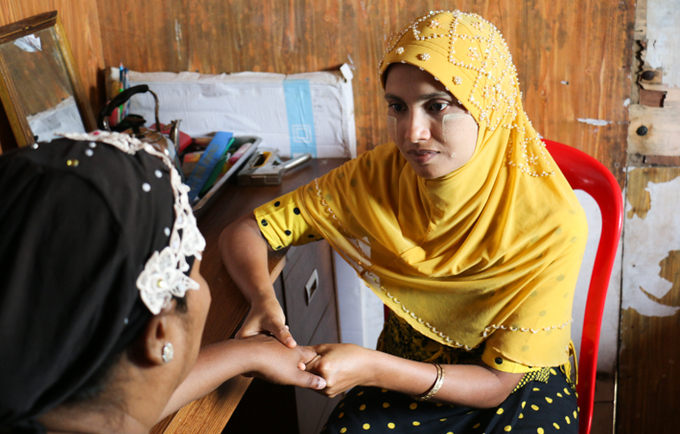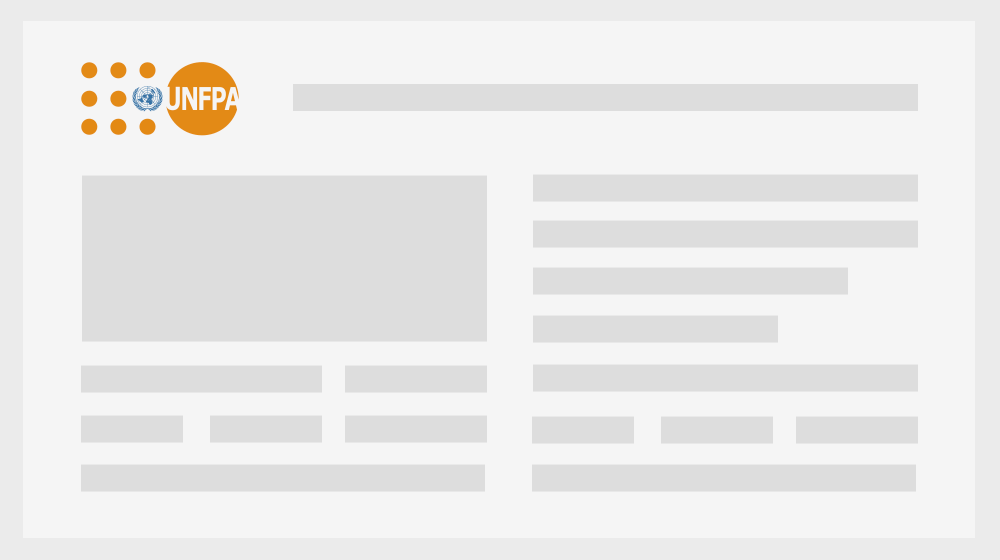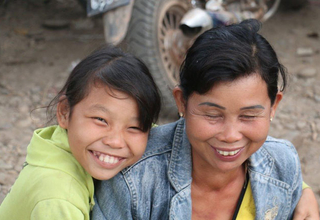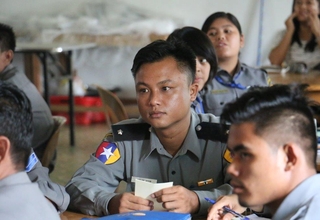RAKHINE, Myanmar - “Very bad things happen during religious festivals. Most community members go to join in the ceremonies, and those women who remain at home are very vulnerable. Perpetrators find out who has stayed behind – often widows – and go into their homes and violate the women. There are no locks on the doors, no protection. For a few hours, everywhere is deserted, and there is no-one who can hear or heed calls for help.”
Myint Myint Htay – Htay for short – is a gender-based violence caseworker in a camp for displaced people in Myanmar’s Rakhine State. While the attention is on the over 700,000 people who have fled persecution and violence in Myanmar to Bangladesh since last August, nearly 130,000 people who identify as Rohingya remain in camps in Myanmar. Confined to the camps, they lack basic services and rights, including freedom of movement. Their plight is largely unseen by the world.
In the camps, violence against women is widespread. Is it largely normalized and accepted in communities and homes. Shame and the fear of stigma and reprisal prevent women from seeking help or justice on account of gender-based violence. They suffer in silence, whether from assault and rape by an unknown attacker, or from repeated abuse and rape by a husband or another family member.
Piloting integration for better care
GBV case worker Htay is part of a UNFPA initiative to integrate medical and gender-based violence services. Under the Women and Girls First Programme, the integration is rolled out in the camps as well as in other parts of Rakhine and Myanmar. Women and adolescent girls often seek urgent medical care for grave injuries incurred from gender-based violence, such as sexual and domestic violence. When the doctors, nurses or another clinic staff see a woman who they believe has been abused or assaulted, they alert Htay. Her small combined office and consultation room is located in the same bamboo structure as the camp health clinic, and she can discreetly encourage the woman to join her for a private consultation.
“How I approach her and help her depends on what has happened. If she is traumatized, I provide psychosocial first aid. In some situations, a woman may only be able come for a one-off counselling session, while in other cases, I provide longer term counselling”, says Htay, and continues:
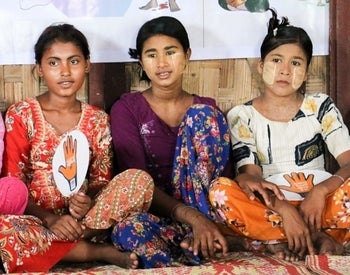
“If she has been raped or sexually abused, I also provide information about how to prevent unwanted pregnancy, and how to avoid contracting HIV and other sexually transmitted infections. If she chooses to receive post-exposure prophylaxis treatment against HIV or the emergency contraceptive pill, then there is no time to waste. She must start taking the drugs within 72 hours of the assault. To make sure she gets the treatment, I go together with her to the clinic next door.”
Integration of different medical and social services has been successfully piloted and practiced for many years now both globally and in Myanmar. For example, instead of offering services for closely related needs such as family planning, maternal health and sexually transmitted infections in separate clinics, many health providers now offer all these services under the same roof. UNFPA is working with several partners to apply the same integration concept to medical and gender-based violence services.
“She was just a child”
Service integration is often easier said than done because it is constitutes a challenge to existing silo mentalities. The close collaboration between social workers and medical health staff in the camps for internally displaced people in Rakhine demonstrates one way in which boundaries are being pushed, and how this is benefitting those left further behind.
The intervention of a committed social worker can make the difference between life and death for vulnerable women and girls who come to the clinic, and who are subjected to a multitude of physical and social violations. The destiny of an adolescent girl still weighs on Htay. She tells the story with an agitated intensity:
“She was taken to the clinic after an unsafe abortion that went terribly wrong. She was bleeding. The basic camp clinic didn’t have the means the help her. She was just a child.”
The price of a life
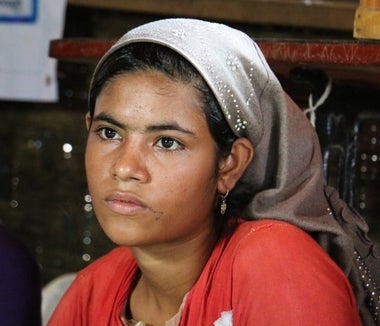
All the odds were stacked up against this girl. Her boyfriend had said he would marry her, but he abandoned her when she became pregnant. She was then subjected to an unsafe abortion with catastrophic consequences. Injured, stigmatized and powerless, who would insist that her life mattered? Who would find the 50 dollars of kickbacks and unofficial payments needed to achieve emergency permission for her to leave the camp, and to obtain transport to and treatment at Sittwe hospital?”
“It was a medical emergency, but it was more than that. She had been violated. By the sexual intercourse for which she was much too young, by the broken promise of marriage, by the family that allowed the unsafe abortion. I pleaded with her family, with the authorities, with the ambulance drivers. When dark came and we’d missed the curfew to leave the camp, we had to wait through the night. When she was finally taken to hospital the next day, I didn’t think she would survive.”
Yet the girl lived, and her story burns inside Htay. She feels it like fury. When the respect for life is so low, when justice is so unattainable, when there is no way out, what keeps Htay going is the knowledge that she has the power to reclaim life, health and dignity for women and girls in the camp.
In a collaboration the International Rescue Committee, UNFPA funds gender-based violence caseworkers in four health clinics in camps for internally displaced people in Rakhine, Myanmar. The initiative is part of the Women and Girls First Programme, which is supported by Australia, Finland, Italy and Sweden.
